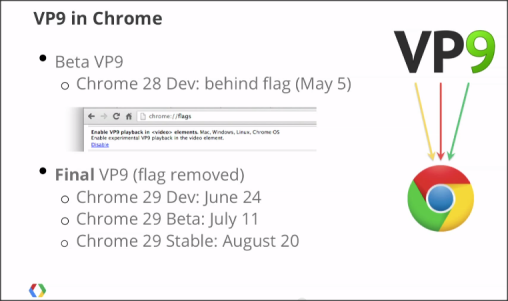Google's VP9 web video codec enters home straight
 As planned in May, Google has now finalised the bit stream for VP9, its open video compression format. Chromium has included a beta VP9 decoder for some time and this has now been activated by default according to an entry in the issue tracker reading "Remove VP9 flag, and enable VP9 by default". VP9 can also be enabled in the developer version of Chromium and Chrome ("Enable VP9 playback in <video> elements"). Google is planning to incorporate the final version of VP9 into Chrome 29 and enable it by default by 20 August. It is nonetheless likely to be some time before VP9 achieves a critical mass on YouTube – to date VP9 is limited to a few demo videos.
As planned in May, Google has now finalised the bit stream for VP9, its open video compression format. Chromium has included a beta VP9 decoder for some time and this has now been activated by default according to an entry in the issue tracker reading "Remove VP9 flag, and enable VP9 by default". VP9 can also be enabled in the developer version of Chromium and Chrome ("Enable VP9 playback in <video> elements"). Google is planning to incorporate the final version of VP9 into Chrome 29 and enable it by default by 20 August. It is nonetheless likely to be some time before VP9 achieves a critical mass on YouTube – to date VP9 is limited to a few demo videos.
VP9 is designed to have 50 per cent lower bit rates than predecessor codec VP8 and is expected to square up to High Efficiency Video Coding (HEVC/H.265), the successor to H.264, which was signed off by the ITU and ISO/MPEG in late January.

![]() The final version of the VP9 codec, designed for HTML5 video and WebRTC, should be incorporated into Chrome by the end of August
The final version of the VP9 codec, designed for HTML5 video and WebRTC, should be incorporated into Chrome by the end of August
Source: Presentation at Google I/O
Google and its partners in the WebM project want to establish the codec as a royalty-free standard for HTML5 video and for web video calling using WebRTC. WebM advocates still have a number of patent hurdles to overcome, however.
Following its takeover of VP developer On2 Technologies, Google now owns essential patents for the compression algorithm and it released the earlier VP8 codec under an irrevocable open source licence. Patent management firm MPEG LA has, however, collected together patent claims against VP8. Twelve companies have reported patent claims; eleven of them agreed a licensing agreement with Google in early March, which should provide VP8 and its successor VP9 with broad patent security. The resulting new patent license for third parties has resulted in some criticism from open source advocates, though the SFLC believes the separate patent licence does not cause problems.
The twelfth member of the group was Nokia, which was also involved in developing H.264 and H.265. The Finnish company has lodged complaints against VP8 with the IETF and has lined up some of its own video compression patents against VP8 and by extension VP9.
(sno)
![Kernel Log: Coming in 3.10 (Part 3) [--] Infrastructure](/imgs/43/1/0/4/2/6/7/2/comingin310_4_kicker-4977194bfb0de0d7.png)

![Kernel Log: Coming in 3.10 (Part 3) [--] Infrastructure](/imgs/43/1/0/4/2/3/2/3/comingin310_3_kicker-151cd7b9e9660f05.png)
















